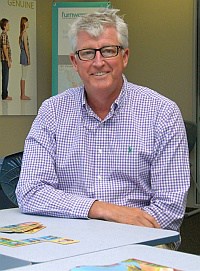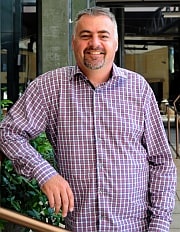Keith Newman discovers that ‘busyness’ is not necessarily good for business and some management teams might need an ice cube down their back to shock them into working ‘on’ their business rather than ‘in’ it.
Having their management styles and business practices placed under close scrutiny in a room full of their peers, was the wake-up call a number of Hawke’s Bay business owners needed to bust them out of their comfort zone and back on to the growth curve.
About 30 local owners and managers now consider themselves part of the 3,000 strong ICEHOUSE ‘family’ of alumni who, having completed one of a series of business growth programmes, came away with fresh thinking that helped transform their companies.
The local graduates get together for an annual dinner to keep up with the play and encourage one another, and are hopeful their network is about to hit a growth curve of its own as Auckland-based ICEHOUSE begins to run local courses and consider the logistics of establishing a physical presence here.
Business Hawke’s Bay is committed to bringing the ICEHOUSE and its network of business growth gurus to Hawke’s Bay and is working closely with past graduates, a new generation of owners and managers and Peter Wogan, the man who will spearhead the move.
Wogan, who grew up at Awanui, half an hour north of Napier and attended Napier Boys’ High School, has been a business coach and resident executive with ICEHOUSE for three years. His company, Fresh Perspective Leadership, is a partner, delivering tailored ICEHOUSE programmes to the regions. The plan for a physical presence in Hawke’s Bay will be a first.
Wogan says owners and business managers often need to get out of their own space and interact with a broader network of businesses to pick up fresh ideas and inspiration. “They might just need to talk things through with someone to validate their ideas; others may need a rocket up their butt. They come along to be challenged and test the gaps in their business.”
Business growth centre
ICEHOUSE had its genesis at Auckland University as a kind of incubator for start-ups where new ideas could be nurtured. However 90% of those engaging were established businesses, so it incubated itself into a business growth centre.
One of the big picture objectives of ICEHOUSE is to improve New Zealand’s performance in the OECD top 30 by helping a thousand businesses ramp up their exports; its Hawke’s Bay foray is part of its think globally and act locally – or in this case regionally – approach.
Wogan says ICEHOUSE is about passion, drive, contacts and knowing what to look for at certain stages when you need help. Having a local presence will make courses and resources more accessible and affordable, although attendees will still be encouraged to spend time in Auckland, rubbing shoulders with business from other regions and ‘executives in residence’ for coaching and consulting.
Part of the ICEHOUSE ethos is to hook people up with networks of local and international resources, export-focused experts, angel investors and to assist with developing and commercialising the best ideas.
Hamish Whyte, the owner of Hastings-based Furnware which manufactures ergonomic furniture for the global education market, was inspired to take the course after hearing how it had impacted other local businesspeople, including Robert Darroch of Future Products Group.
He did a one day course and “the light went on” so he was back for more, taking the owner-manager programme, which tipped him out of his comfort zone giving him confidence to be more open about his strengths and weaknesses and “not to take things too personally”.
Being in the same room with 15-22 other owner-managers was a great way to build a support and contact network and get focused. “People open up and discuss the good, bad and ugly and challenges they face and you learn a huge amount from those who are living it. It’s not about textbooks, it’s about action,” says Whyte.
Similar but not the same
One of the first revelations was that all businesses face similar challenges and threats. “A lot of people think the issues, concerns and constraints they face are unique, but you still need to do a swat analysis of your market, look at the people around you and how you structure your management, and have a clearly-defined business plan which can be as simple as a one-pager.”
While Furnware had a business plan that everyone agreed on, it basically got put away after being reviewed every two years. That’s all changed and now it’s a living document.
To ensure his management team were on the same page he sent his accountant, marketing and operational managers to Auckland for separate leadership development programmes over a three month period.
“They came back knowing that we had an outstanding business but that we could do better and as a result we have changed the way we do business.” Since then, he claims they’ve “easily doubled” the size of the business.
Of course, if the ICEHOUSE had a base in Hawke’s Bay he could have saved himself thousands of dollars in airfares alone. But that’s not the only reason he’s keen to see the business development programme have a local presence.
“I know through living in Hawke’s Bay that it would open the floodgates for so many businesses here. Currently there isn’t a forum that would help owners open up to each other like this.”
ICEHOUSE representative Peter Wogan, in completing his Hawke’s Bay evaluation, was stunned to learn Bay employment and tourism numbers have been going backwards for a decade but encouraged at the “incredible amount of innovative people doing cool things in the region and overseas”.
Co-ordinated collaboration
To compensate for the fact there’s no large business or corporate infrastructure in the region, he sees the ICEHOUSE taking a strategic role in bringing some cohesion to the resources that are here. “There’s innovation, enough capital that can be invested, but not the glue to bring it all together.”
Being ‘the glue’ means not only working with businesses and Business HB but liaising with other regional consultants and agencies. “I still have a lot of contacts in the Bay and am absolutely passionate about helping the business environment,” says Wogan.
The great need is around leadership development, strategic planning, business readiness to export, governance and how to embed new learning into businesses and management teams. In terms of governance, he says the strong ‘Back to the Bay’ campaign has seen many who’ve had success overseas returning and wanting to help the Bay lift its game.
Wogan says Kiwis generally do this badly and there needs to be a smart process around making the best use of these resources. “There are few of these people in the country and there’s a lot of demand on their time, so we need to clarify specifically what the business needs are.”
If they haven’t done their homework, “it can take up a lot of unnecessary time from these passionate, skilled people who want to give something back”.
Tim Nowell-Usticke, owner of Hasting-based Wineworks, New Zealand’s largest bottling operation, is a self-confessed ICEHOUSE fan. He completed the owner-manager’s course and says he’ll be sending his managers to attend the Hawke’s Bay courses.
He says, getting alongside other businesses and hearing how they solved their problems is inspiring and prevents you from making the same mistakes. “It’s a real world training organisation that uses not only commercially-experienced lecturers but helps you bounce off the stories and experiences of others.”
Nowell-Usticke realised he needed to pay more attention to his planning process and wasn’t fully focused on customer experience. He’s now aware that even at senior level, ongoing training is important.
His ICEHOUSE training further cemented his view that Hawke’s Bay needs to keep focused on what already sets it apart, and that’s growing and processing food and beverages. “We have the right temperature, lots of water and the factories and processing skills to turn crops of low value into something of high value.”
He says our processing capabilities could handle tonnes more produce and deliver a greater variety of products; our efficient processes and good export port are ideal for other regions to have their food and beverages processed here.
He reckons one of the problems in Hawke’s Bay is that businesses tend to forget what they can do. “It’s not a problem with the processing industry, it’s just that not enough people believe they can sell food and beverage from Hawke’s Bay to the rest of the world. We need more entrepreneurs, more people prepared to say, ‘let’s take those pumpkins and turn them into baby food and export to China’.”
Ok, but entrepreneurs take risks and many managers are risk averse, so how do you change that? Nowell-Usticke suggests that after doing an ICEHOUSE course, managers may be more open to entrepreneurs driving things forward.
Hamish Whyte believes ICEHOUSE, with its focused network that can offer structured workshops and brainstorming sessions, goes well beyond anything the Chamber of Commerce or mentors or individual consultants can deliver.
He sees about six local ICEHOUSE alumni regularly in social situations where they talk about business issues
and he recently assisted one company with distribution and business contacts in Australia.
The challenge for Hawke’s Bay, he says, is whether we really need to hunt down and lobby other businesses to come here, or get those already here doing better.
The easiest place to start would be to get existing businesses to produce 20% more; increase their turnover by 10%, employ one more person or start exporting. “You don’t want regulation or constraints; you need to show direction and if you do it right then others will follow.”
For those looking to make export inroads there’s an international network of expertise to call on, including access to the Beachheads programme, with assistance from New Zealand Trade and Enterprise (NZTE), a key provider of funding to ICEHOUSE.
Rob Adams from the US, part of the ICEHOUSE market validation programme, throws out scary statements like: only 35% of new products launched by established companies succeed, and in the start-up world that drops dramatically to 10%. His methodology as part of the ICEHOUSE programme is to improve those odds and reduce the risks.
Wogan says one of the obstacles many have to get past is the cultural resistance many New Zealand business owners have to sharing details … for fear they’ll lose competitive edge or have someone pinch their ideas.
In the end he says the real challenge is, how serious are you about growing your business or perhaps going international? “The fact that they are in these programmes in the first place means they are looking for help.”




